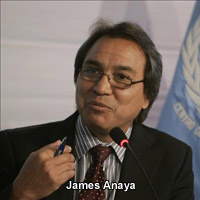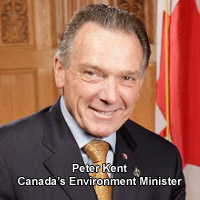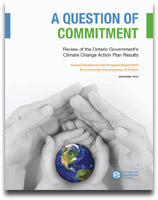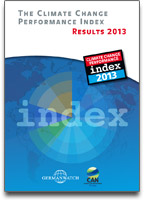
News |
- UN Expert Calls for Meaningful Dialogue After Weeks of Protests
- First Nations Issue Demands
- Aussies Change Weather Charts, 2012 Warmest Year Ever for US
- Idle No More Result - Prime Minister to Meet January 11
- US Biodiesel Tax Credit Wastes Money, IISD
- Time to Stop Spinning Our Wheels - Suzuki
- Energy Plan and Sustainability Act Under Review
- Greenpeace Leaves Boreal Agreement
- Doha Resolves Little
- Kent Finally Meets With Climate Groups
- Ontario Retreats on Climate Change
- Canada Ranked 58th in Climate Change Index 2013
| UN Expert Calls for Meaningful Dialogue After Weeks of Protests | 11 January 13 |

"Dialogue between the Government and First Nations should proceed in accordance with the standards expressed in the UN Declaration on the Rights of Indigenous Peoples [UNDRIP], ... with a relationship based on good faith, partnership and mutual respect," stated Anaya. Anaya highlighted in particular the UN declaration preamble, which affirms that "treaties, agreements and other arrangements ... are the basis for a strengthened partnership between indigenous peoples and States." The Special Rapporteur reiterated his concern about the Canadian situation, as expressed in a written communication to the Canadian Government asking the authorities to provide relevant information, in accordance with terms of his mandate from the UN Human Rights Council. "I will continue to monitor developments as I hold out hope... [for] meaningful and restorative action by the Government and First Nations leadership," Mr. Anaya said. The UN Human Rights Council appointed S. James Anaya as Special Rapporteur on the rights of indigenous peoples in March 2008. Mr. Anaya is a Regents Professor and the James J. Lenoir Professor of Human Rights Law and Policy at the University of Arizona (United States). As Special Rapporteur, he is independent from any government or organization and serves in his individual capacity. View January 8, 2013 United Nations: Office of the High Commissioner for Human Rights press releaseView January 8, 2013 United Nations News Service coverage View January 9, 2013 Yahoo News coverage Sources:
United Nations
|
|
 Print version Print version |
Top |
| First Nations Issue Demands | 11 January 13 |

"It is time we broke through the paralysis and endless broken promises and it is time to act," said National Chief Shawn Atleo. The Assembly of First Nations list of short-and long-term demands would lead to restoration of the nation-to-nation relationship envisioned in treaties signed between indigenous peoples and the Crown in the 18th century. The "high-level commitments" the chiefs are seeking from Harper include:
Despite opposition from many chiefs in Ontario, Manitoba, Northwest Territory and Saskatchewan chiefs, Assembly of First Nations National Chief Shawn Atleo led a delegation of about 16 First Nations leaders to meet with the Prime Minister and several cabinet ministers on January 11, 2012. Those opposing the meeting wanted Governor General David Johnston to appear along with the Prime Minister. Johnston agreed to meet First Nations leaders, but at his Rideau Hall residence after the working meeting. This did not satisfy many Chiefs who said they would refuse to attend the meting with the Prime Minister if the Governor General was not there. Chief Teresa Spence did not attend the meeting with the Prime Minister, but looked like she would go to the Governor General's residence. First Nations signed their treaties with a representative of the Queen, and since this week's meetings are about modernizing those treaties, they need the Queen's representative present once again, said David Harper, grand chief of Manitoba Keewatinowi Okimakanak. "This didn't just pop up yesterday," said Manitoba's grand chief, Derek Nepinak, pointing out that Spence always asked for Johnston to be part of the process. We're not here to sign a new funding deal, or to make ... new funding arrangements. That's not what we're here for. We recognize 140 years of colonial rule in our territory, 140 years of colonial rule that has created great consequences, devastating consequences for our communities," Nepinak explained. As a result, Manitoba First Nations are now short 17,000 homes, lack clean drinking water and have poor health outcomes, he said. View January 11, 2013 APTN coverageView January 11, 2013 Globe and Mail coverage View January 10, 2013 Maclean's coverage View January 10, 2013 Toronto Star coverage Watch Manitoba Grand Chief Derek Nepinak speaks at a press conference in Ottawa CBC News Jan 10 2013 Sources:
Toronto Star, Maclean's, Globe and Mail
|
|
 Print version Print version |
Top |
| Aussies Change Weather Charts, 2012 Warmest Year Ever for US | 11 January 13 |

For the United States: "2012 marks the warmest year on record for the contiguous U.S.," stated Jake Crouch, a climate scientist at the National Climatic Data Center at the U.S. National Oceanic and Atmospheric Administration (NOAA) January 8, 2013. According to a new NOAA report, the average temperature for the lower 48 states in 2012 was 13 Degrees Celsius (°C) [55.3 Degrees Fahrenheit (°F)], shattering the previous 1998 record of 12.4 °C (54.3 °F). NOAA also announced 2012 was the second most expensive year on record for U.S. weather disasters. 2012 witnessed more than $1 billion in damages from extensive heat and drought, western wildfires, and the destruction from Hurricane Sandy (which rode in on a super-high tide due to rising sea levels). "The blazing temperatures that scorched America in 2012 are a bitter taste of the climate chaos ahead. Science tells us that our rapidly warming planet will endure more heat waves, droughts and extreme weather." said Dr. Shaye Wolf, climate science director with the Center for Biological Diversity. Australia began 2013 in the midst of an excessive heat wave, causing catastrophic wild fires so massive they can be seen from satellite images in space. Temperatures exceeding 50°C (122 °F) caused Australia's Bureau of Meteorology to add new colours to its interactive weather forecasting chart to extend its previous temperature range that had been capped at 50 degrees. Australia's first seven days of 2013 were all among the hottest 20 days on record in terms of average maximums, with the country setting a new national average maximum of 40.33 °C (104.6 °F) on January 7, 2013. View January 9, 2013 National Geographic coverageView January 9, 2013 Atlantic Wire coverage View January 8, 2013 CommonDreams.org coverage View January 8, 2013 Sydney Morning Herald coverage View January 8, 2013 Union of Concerned Scientists coverage View January 8, 2013 New York Times coverage View January 8, 2012 Atlantic Wire View NOAA 2011: State of the Climate Global Analysis Sources:
Sydney Morning Herald
|
|
 Print version Print version |
Top |
| Idle No More Result - Prime Minister to Meet January 11 |
4 January 13 |

Source: John Woods / Winnipeg Free Press
First Nation chiefs from across Canada held a summit in Ottawa December 11, 2012 to make it clear that this second omnibus bill, with its continued legal changes made without consultation, was not acceptable. At the same time activists were assessing Bill C 45, identifying the impacts to natural resources, and rights from the Bill. Discussions and presentations in meetings were titled Idle No More to show that First Nations were responding to the set of changes in law made without consultation. Social media, flash mobs in shopping malls across Canada, similar events in the US, and other countries, continued throughout December and into January 2013. Support for Idle No More comes from communities, individuals and organizations who support the two goals of Idle No More: "Idle No More activities will not stop until we reach our two goals: Indigenous sovereignty (Nation to Nation relationship) and protection of the land and water (Social and Environmental Sustainability)." Many supporters also aim to see the end of omnibus budget bills which change many laws, without notification or debate. Friday January 4, 2013 prime minister Stephen Harper indicated he would meet with a delegation of Chiefs in one week's time. This meeting is a demand of Chief Teresa Spence, who has been on a hunger strike in Ottawa, since December 11, 2012. View January 4, 2013 BBC News articleView January 4, 2013 Prime Minister Stephen Harper announcement View January 4, 2013 Toronto Star article View January 2, 2013 Toronto Star article View January 1, 2013 The Globe and Mail article View Idle No More Facebook page View Idle No More blog View December 31, 2012 Winnipeg Free Press slideshow View January 3, 2013 Common Dreams article |
|
 Print version Print version |
Top |
| US Biodiesel Tax Credit Wastes Money, IISD | 4 January 13 |

Critics point out the economic and environmental benefits of subsidizing biodiesel are doubtful, making the tax credits a huge waste of American taxpayer funds. "This would be an irresponsible move at the best of times, but is scandalous when Americans are preoccupied with a ballooning budget deficit," said Mark Halle, vice-president, international, of the International Institute for Sustainable Development, a public policy think-tank. Applying the tax credit retroactively will create no additional biodiesel production in the U.S., it will merely reward existing producers, many of whom are already subsidized by individual U.S. states. International Institute for Sustainable Development (IISD), a Winnipeg based environmentally focused global think-tank, produced a series of studies entitled Biofuels - At What Cost?. The series showed biofuel subsidies to be an extremely expensive way to address climate change. Reducing greenhouse gas (GHG) emissions by subsidizing biofuels was found to be 33 times more expensive than purchasing the equivalent amount of carbon offsets on the Chicago Climate Exchange. "Concern over biofuel subsidies is one of the few issues that unite a wide range of interested parties, from fiscal conservatives to environmentalists," said Peter Wooders, senior economist at the IISD's Global Subsidies Initiative. View January 4, 2013 IISD press releaseView IISD Biofuels - At What Cost? series View January 3, 2013 New York Times coverage View January 3, 2013 See News Renewables coverage View January 2, 2013 Mother Nature Network coverage View January 2, 2013 Toronto Dominion Waterhouse research coverage |
|
 Print version Print version |
Top |
| Time to Stop Spinning Our Wheels - Suzuki | 4 January 13 |

"In 1992, more than 1,700 eminent scientists, including 104 Nobel prizewinners, signed the "World Scientists' Warning to Humanity", which included this urgent warning: "No more than one or a few decades remain before the chance to avert the threats we now confront will be lost and the prospects for humanity immeasurably diminished." The document concluded that environmentally damaging activity must be brought under control and the integrity of Earth's ecosystems protected. The sooner we act, the easier it will be to overcome these difficult challenges. Every year that we stall makes it more costly and challenging, with increasing negative impacts on humans and our environment. There are signs of hope. Many countries — as well as cities, states and provinces — are taking global warming seriously and are working to reduce emissions and shift to cleaner energy sources. Some world leaders are even questioning our current paradigm, where the economy is made a priority above all else. Surely it must be subordinate to a rich, diverse ecosphere that sustains all life. Let's hope this year ushers in a new way of living on and caring for our planet." View January 3, 2013 David Suzuki Foundation articleView 1992 World Scientists' Warning to Humanity View April 2, 2012 United Nations article View March 23, 2012 United Nations article View June 30, 2008 Green Party of Canada news release |
|
 Print version Print version |
Top |
| Energy Plan and Sustainability Act Under Review | 21 December 12 |

Recently the Manitoba government also released a discussion paper about its plan to update Manitoba's Sustainable Development Act. Citizens can send comments until February 28, 2013, based on the discussion paper. It appears that comments are only through a web page. The Manitoba NDP condoned the COSDI report when it was released, and then made it government policy when they formed government. COSDI called for a significant improvement in the public registry in Manitoba, with access to public review comments, including for planning, new legislation and policy reviews. "It is time to hold public meetings to encourage Manitobans to provide their feedback and comments in a conversation about our energy future and sustainability in our province." said Gaile Whelan Enns, director, Manitoba Wildlands. View December 20, 2012 Government of Manitoba media bulletinView Government of Manitoba Green Prosperity Act Consultation page View November 20, 2012 Government of Manitoba media bulletin |
|
 Print version Print version |
Top |
| Greenpeace Leaves Boreal Agreement | 21 December 12 |

Greenpeace Canada forest coordinator said in the December 6th statement, "The Canadian Boreal Forest Agreement was a framework for cooperation whereby companies like Resolute Forest Products agreed to stay out of areas of important habitat. When the biggest logging company in the Boreal Forest goes back on its word to stay out of critical habitat, it signals the Agreement has broken down." Resolute Forest Products denies any wrong-doing. Greenpeace has released video and images of roads cut through old growth forest in an area designated as being off limits and under consideration for protection in the future. Under the CBFA, loggers pledged to suspend new logging in 29 million hectares of forest until final conservation plans were approved. Off-limit areas covered roughly 40 percent of total forest in question. In exchange environmental groups, including Greenpeace, agreed to no longer stage protests and campaigns against the 20 logging companies singed onto the CBFA. View December 7, 2012 Digital Journal articleView December 6, 2012 Forests.org News Release View December 6, 2012 CBC News article View December 6, 2012 Huffington Post article View December 6, 2012 Greenpeace Canada coverage View The Canadian Boreal Forest Agreement View March 18, 2011 Digital Journal article |
|
 Print version Print version |
Top |
| Doha Resolves Little | 14 December 12 |

Potentially the most import discussion at Doha was the talk of financing the response for climate change. "The climate change phenomenon has been caused by the industrialization of the developed world. It's only fair and reasonable that the developed world should bear most of the responsibility," said UN Secretary-General Ban Ki-moon. 2009 UN climate negotiations in Copenhagen, Denmark agreed to a fast-start financing commitment to mobilize US$ 10 billion per year between 2010-2012. With a longer-term pledge to reach an annual target of US$ 100 billion by 2020 to establish a Green Climate Fund was also agreed to. With no firm funding commitments beyond 2013, developing countries pushed richer nations to scale up climate aid to poor countries to meet the $100 billion annual commitment. But rich nations were generally unwilling to make specific commitments at Doha, citing world financial turmoil and pressure on their budgets. "The Canadian Government was determined to lead the race to the bottom on the central issue of finance, insisting on holding out for at least 3 more years until they contribute to the Green Climate Fund," said Hannah McKinnon, Climate Action Network Canada Campaigns Director. The European Union, Australia, Switzerland, Norway and several other industrialized nations did manage to conclude negotiations on a new commitment period under the Kyoto Protocol. However, the second phase only covers about 15 per cent of global emissions after Canada, Japan, New Zealand and Russia opted out. The Unites States is not a signatory to Kyoto. Countries also failed to move beyond the greenhouse gas (GHG) emission reduction pledges that have been on the table since the Copenhagen conference in 2009. "Bopha, Sandy, floods in Pakistan, droughts in China... How many reports from the likes of the World Bank, NASA and the International Energy Agency will it take? How many preventable catastrophes until our leaders realize that climate change will not be solved by nice speeches and empty promises? Countries like Canada and the U.S. have promised to reduce their greenhouse gas pollution and provide adequate financial support for developing countries. They have so far failed on both counts," Steven Guilbeault, Deputy Director, Equiterre. View December 10, 2012 Climate Group blog coverageView December 8, 2012 Climate Action Network Canada press release View December 8, 2012 Climate Action Network International press release (PDF) View December 8, 2012 United Nations Climate Change Secretariat press release (PDF) View December 8, 2012 Ottawa Citizen coverage View December 7, 2012 Environment Canada press release View November 26, 2012 World Resources Institute Chart (PDF) Source:
Climate Group, Climate Action Network Canada, Climate Action Network International
|
|
 Print version Print version |
Top |
| Kent Finally Meets With Climate Groups | 12 December 12 |

The civil society representatives delivered messages to Kent on behalf of: youth, First Nations, faith, environmental organizations and vulnerable countries. They called on the minister to reverse Canada's position and take immediate and ambitious action to address climate change. "The scientific community urges Ministers not to ignore the evidence; the problem is well defined; we now need to focus on solutions; further delay is not a responsible option," said Dr. John Stone, Intergovernmental Panel on Climate Change Scientist. "In regards to climate change, my people can tell you that yes, it is real. All First Nations are willing to share and teach, but are you ready to listen?" asked Mikey Etherington, Aboriginal Youth Initiatives, Ontario Federation of Indian Friendship Centres. "Faith communities are concerned about the lack of progress in climate change negotiations and are monitoring them closely. We have a moral imperative to act," said Joy Kennedy, United Church of Canada Poverty, Wealth and Ecological Justice Coordinator. "Time is short, but the opportunity still exists to give the next generation of Canadians the hope of a decent job and a sustainable future. That great transition must start now," said Brian Kohler, IndustriAll Global Union Director, Health, Safety and Sustainability. This meeting was the first Minister Kent had with climate-focused civil society climate groups since becoming minister. In contrast Kent has met with the fossil fuel lobby at least 48 times since becoming Minister of the Environment. Canada has again been singled out at the UN climate conference in Doha for a lack of action on combatting climate change. Canada for the fifth year in a row received the "Colossal Fossil Award" December 7, 2012 in Doha, except this year New Zealand shared the "award" alongside Canada. The "Colossal Fossil," is a moniker awarded annually by Climate Action Network International, a group of roughly 700 NGOs whose members vote to select the country or countries that have done the most to block progress at the United Nations Climate Change Conference. View December 8, 2012 China.org coverageView December 7, 2012 Climate Action Network International Colossal Fossil award video View December 7, 2012 Climate Action International Colossal Fossil press release View December 6, 2012 Climate Action Network Canada press release View December 6, 2012 Climate Action Network Canada civil society statements View December 3, 2012 Climate Action Network Canada press release Source:
Climate Action Network Canada
|
|
 Print version Print version |
Top |
| Ontario Retreats on Climate Change | 12 December 12 |

"Clearly the Ontario government's commitment to responding to GHG emissions and climate change has become questionable. At a time when President Obama says he is focusing on climate change as part of his second term agenda, the Ontario government is ending or scaling back programs to fight GHG emissions, and will fall far short of meeting its 2020 and 2050 targets," said Miller. The Environmental Commissioner released A Question of Commitment, his 2012 annual review of the government's Climate Change Action Plan, on December 4, 2012. Miller acknowledges the phase-out of coal-fired generation has helped the government reach 90% of its 2014 target, but he points to four areas where Ontario has scaled back programs: 1) cancelling green commercial vehicle program; 2) cutting funding for electric vehicle program; 3) delaying construction on high-occupancy vehicle lanes; and, 4) not implementing a "cap and trade" program. Miller recommends implementing a carbon-pricing system to combat climate change. "Other jurisdictions are demonstrating carbon pricing can be adopted without hurting economic growth, while delivering lowered GHG emissions. Decisive action on carbon pricing could provide an elusive win-win-win for the government, economy and the environment," said Miller. "With each passing year it becomes clearer that without new policies and a drastic change in the current upward trajectory of GHG emissions, our planet is headed for a frightening future," added Miller. View December 4, 2012 Ontario Environmental Commissioner A Question of Commitment reportView December 4, 2012 Ontario Environmental Commissioner blog View December 4, 2012 CTV coverage View December 4, 2012 Canadian press coverage View December 4, 2012 CityNews Toronto coverage View December 6, 2012 Financial Post coverage Source:
Ontario Environmental Commissioner
|
|
 Print version Print version |
Top |
| Canada Ranked 58th in Climate Change Index 2013 | 12 December 12 |

"At a time when institutions such as the World Bank and the International Energy Agency are calling for more climate action it is disappointing to have so many countries still being reluctant to move forward. Canada is a strong example of this lack of willingness to improve climate policies," Wendel Trio, director of the Climate Action Network-Europe, said in a statement. Canada ranked 58th in the CCPI 2013, ahead of only Saudi Arabia, Australia and Iran. Countries made up of vast expanses of desert. GermanWatch and Climate Action Network International publish the index each year. View The Climate Change Performance Index 2013View December 5, 2012 Huffington Post article View CBC News Climate Change FAQ View December 6, 2012 CBC News article View December 12, 2012 Copenhagen Capacity article |
|
 Print version Print version |
Top |


 RSS Feeds:
RSS Feeds: